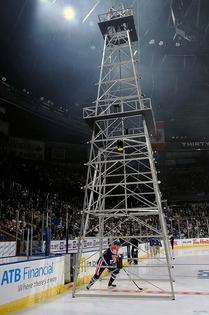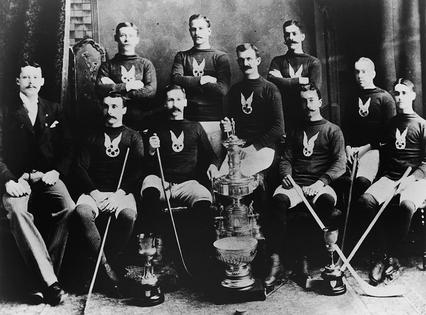‘Loyal to the Oil’: Finding religion in the Stanley Cup finals
Published in News & Features
Hockey’s biggest prize is the Stanley Cup, and for the first time in nearly two decades, the Edmonton Oilers are vying for it. Hoping to stage a comeback against the Florida Panthers, the Oilers are two wins away from becoming National Hockey League champions.
The finals are bringing new attention to Edmonton, former team of the legendary Wayne Gretzky. But they’re also bringing attention to some of Canada’s biggest exports: hockey and oil.
Novelist Leslie McFarlane once observed that for Canadians, “hockey is more than a game; it is almost a religion.” Now that the Oilers have a chance to bring the Stanley Cup back to Canada for the first time in nearly 30 years, prayers and superstitions abound, from wearing special clothing to fans averting their eyes during penalty shots.
The Oilers also evoke another aspect of Canadian society with almost religious importance: resource extraction. In American and Canadian culture, oil has long been entangled with religion. It’s a national blessing from God, in some people’s eyes, and a means to the “good life” for those who persevere to find it.
We are scholars of religion who study sports and how oil shapes society, or petro-cultures. The Edmonton Oilers showcase a worldview in which triumph, luck and rugged work pay off – beliefs at home on the ice or in the oil field. The Stanley Cup Final offers a glimpse into how the oil industry has helped shaped the religious fervor around Canada’s favorite sport.
Edmonton is the capital of Alberta, a province known for its massive oil, gas and oil sands reserves. With five refineries producing an average of 3.8 million barrels a day, oil and gas is Alberta’s biggest industry – and a way of life.
This is especially true in Edmonton, known as the “Oil Capital of Canada.” Here, oil not only structures the local economy, but it also shapes identities, architecture and everyday experiences.
Visit the West Edmonton Mall, for example, and you’ll see a statue of three oil workers drilling, reminding shoppers that petroleum is the bedrock of their commerce. Visit the Canadian Energy Museum to learn how oil and gas have remade the region since the late 1940s, and glimpse items such as engraved hard hats and the “Oil Patch Kid,” a spin on the iconic “Cabbage Patch Kids” toys. Tour the greater Edmonton area and see how pump jacks dot the horizon. Oil is everywhere, shaping futures, fortunes and possibility.
Set against this backdrop, the Oilers’ name is unsurprising. It is not uncommon, after all, to name teams after local industries. Football’s Pittsburgh Steelers pay homage to the steel mills that once employed much of the team’s fan base. The Tennessee Oilers were originally the Houston Oilers, prompting other Texas teams such as the XFL’s Roughnecks to follow suit. Further north, the name of basketball’s Detroit Pistons references car manufacturing.
Teams with industry-inspired names play double duty, venerating both a place and a trade. Some fans are not only cheering for the home team but cheering for themselves – affirming that their industry and their labor matters.
...continued

















Comments